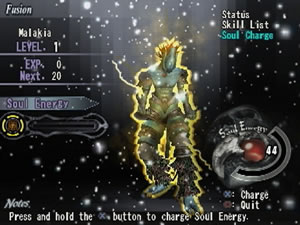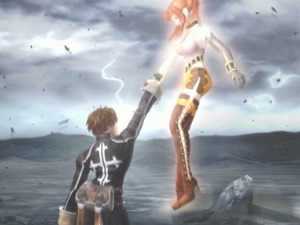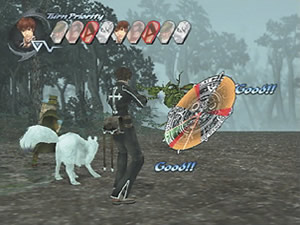Shadow masochism.
Getting old sucks. There are obvious reasons to hate aging, like that whole death
thing, but another ghastly side-effect is rarely mentioned due to its untold
hideousness. I speak of outgrowing your favorite game franchises.
The PC offers some comfort to aging role-playing gamers with edgier material
and titles intended for high-school graduates, but many of my friends, myself
included, have been dying for any of our favorite console games to follow us
into jaded post-pubescence. With every subsequent Final
Fantasy title, we pray
that there will be some difference, some sign of maturation, but instead we
get more of the same refried Chocobo
crap. I was beginning to think I would
never enjoy a Final Fantasy game again.
And then I played Midway’s Shadow Hearts: Covenant, and there was much rejoicing.
A
sequel to 2002’s mediocre Shadow Hearts, Covenant manages
to address many of its predecessor’s issues while preserving the self-conscious
yet raunchy humor that made the original unique. Though the Shadow Hearts games
aren’t made by Square and don’t
actually have anything to do with the Final Fantasy characters
or universe, Covenant looks,
sounds, and plays just like a Final Fantasy game, from the random
battles to the random airships.
While Covenant‘s story is typical in a coming-of-age, existentialist Japanese sort of way, it’s set in a not-so-typical turn of the 20th century Europe and Japan during the first World War. Although your characters never really encounter the war, it’s cool to run around France and hear Wales referred to as a place of strange magic and demons.
But don’t for a minute think this is a serious plot dealing with war and peace,
as Covenant is in practice a brilliant, filthy spoof of classic
RPG conventions. For instance, you collect gay porn for a queer tailor so he’ll
make naughty outfits for your dirty puppeteer’s sexy little doll, Cornelia. Even
crazier is the fact that you can view each article of suggestive smut. Even crazier than
that is the way the puppeteer’s doll sticks her derriere in the air after
winning a battle. Depending on what she’s wearing, this ranges from mildly disturbing
to laugh-out-loud disturbing to “awkward silence” disturbing. The
sleaziest outfit is called “Dark Queen,” and you actually steal it from under
the bed of a leather-clad dominatrix named Veronica, who has the largest breasts
in a video game, ever.
But Veronica’s breasts aren’t just big for the sake of capitalizing on teenage
boob lust; they’re part of the satire. Veronica is the stereotypical “woman with
huge knockers,” like Lulu in Final Fantasy X.
There’s also the annoying little
girl, the hulking but stupid fighter guy, the shallow sage and an animal that
is smarter than everyone else combined. Where the Final
Fantasy games have become
slaves to these conventions, Covenant makes fun of them all
and turns out better for it.
What truly sets Covenant‘s gameplay apart from every other turn-based
Japanese RPG, though, is the feared Judgment Ring. Whenever you issue a command
to attack, use an item, or cast a spell, you’ll have to spin the ring. This pops
up next to the acting character, and a little dial that looks like the seconds
hand on a clock begins to travel around the face of the ring. In order to successfully
act, you must press X whenever the dial is within one of the highlighted areas.
In some cases, each highlighted zone ends in a small, red sliver, and nailing
it in these areas results in a more powerful action.
 Every character has a unique ring, each of which is highly customizable. If you
Every character has a unique ring, each of which is highly customizable. If you
aren’t feeling terribly dexterous, you can set your characters’ rings to auto-ring,
causing Covenant to
play like any turn-based RPG. You also have Normal, Practice, Gamble, and Technical
settings for varying levels of difficulty. You can even acquire items that will
affect your ring’s dial speed, hit-zone size, and added status effects such
as paralysis and slow. For a game with huge dungeons and billions of random
battles, the ability to change-up the combat experience is as essential as
switching between Mountain Dew and Dr. Pepper.
The ring isn’t just for fighting – it’s also great for shopping. As you spend
more money, you’ll gain something like shopping points. If you gain enough, you’ll
acquire skill as a shopper and be able to try for discounts and mark-ups. In
order to receive a given discount or mark-up, you’ll have to tap X as a dial
moves through three high-lighted zones, just like in the battles. It’s like Wheel
of Fortune, but Vanna
White is a swishy Frenchman named Pierre, and you’re spinning
for weaponry instead of cash.
To go with its Judgment Ring and ridiculous spoofy antics, Covenant is
filled with a myriad of neat features. Our favorite was the ability to switch
between parties on the fly. You can only use four characters in any given battle,
but late in the game you have a dozen to choose from. So, you can set up three
different parties and then switch between them any time with the L1 and L2 buttons.
This feature makes it much easier to evenly distribute the XP and is also good
for adding variety to the game’s numerous battles. By the way, you’ll need it.
No existentialist, Japanese RPG would be complete without an evil force hell-bent
on ruining everyone’s life forever, and in Covenant‘s case
this evil force is a triumvirate composed of random battles, no map, and tiny
zones. Covenant has
some humongous dungeons, yet was made on budget technology. As a result, only
a small portion of each dungeon can be rendered at any given time, leading to
some excessive load screens as you wander about. Plus, most of these dungeon
portions look exactly alike, making it quite easy to get lost.
To make matters worse, random battles constantly pop up as you wander aimlessly
through the dungeons. By the time the battle ends, you will have completely
forgotten where you were going. A regular map or the ability to avoid random
battles would have been a life saver. Instead, your interest in playing will
probably dwindle after your 600th random battle in a row.
When you finally do make it out of whatever dungeon you’ve been stuck in, you’ll have to sit through at least a fifteen minute cut-scene. While the characters are compelling and the humor is unique, Covenant‘s pacing can be off. After a long dungeon crawl and a half-hour cut-scene, you’ll probably be ready for bed, even if it’s three in the afternoon.
 With such long lulls in the action, you might like to head off in another direction and raise some giant chickens or herd cats for awhile. Unfortunately, Covenant is linear to a fault and has very few side-quests to choose from. While there is one little treasure hunting quest and a map-game known as Solomon’s Key, the former just throws you into dungeons you’ve already beaten and the latter is a huge pain in the ass. Instead of multiple avenues to explore at any given time, there is generally only one thing to do: crawl through the next dungeon.
With such long lulls in the action, you might like to head off in another direction and raise some giant chickens or herd cats for awhile. Unfortunately, Covenant is linear to a fault and has very few side-quests to choose from. While there is one little treasure hunting quest and a map-game known as Solomon’s Key, the former just throws you into dungeons you’ve already beaten and the latter is a huge pain in the ass. Instead of multiple avenues to explore at any given time, there is generally only one thing to do: crawl through the next dungeon.
Fortunately, some of the dungeons look awesome and feature excellent music. At
one point, you have to travel to an island in search of a flower for some benefactor,
and you enter a palace of blown-glass. The entire dungeon looks like the inside
of a crystal ball and the music fits the scene. This is especially impressive
because Covenant‘s engine isn’t particularly powerful. Enemies are usually
blocky and pixilated, and at times the game looks very three years ago. Props
to Nautilus for making some excellent visuals out of a weak engine, but next
time, how about just making a better engine to begin with?
Covenant also features some good voice talent. All the major
characters (except for Princess Anastasia) sound fine. Credit also has to go
to the well-written dialogue and excellent comedic timing of director Matsuzo
Mashida. It’s tough to sound like a pro when you’re supposed to put all your
heart and soul into lines like “If the gaea energies converge, the spirit forces
will consume the earth.” Of course.
Shadow Hearts: Covenant is a pretty rare RPG, one that pokes
fun at conventions while serving up a good combat system. It’s funny, bizarre
and, at times, downright filthy, precisely the kinds of things I look for in
my Japanese games. Unfortunately, it’s got other things I’m not so crazy
about, like few sub-quests, constant random battles and excessive loading. But
if you like your games sexy, this might be the perfect match.
-
Super spoof!
-
Improved ring system
-
Classic, Japanese RPG style
-
With evil random battles
-
Linear, few side-quests
-
Bad pacing











